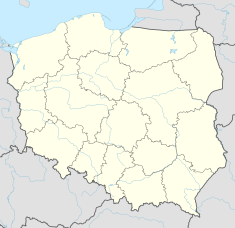| This article needs additional citations for verification. Please help improve this article by adding citations to reliable sources. Unsourced material may be challenged and removed. Find sources: "Gniew Castle" – news · newspapers · books · scholar · JSTOR (June 2024) (Learn how and when to remove this message) |
| This article relies largely or entirely on a single source. Relevant discussion may be found on the talk page. Please help improve this article by introducing citations to additional sources. Find sources: "Gniew Castle" – news · newspapers · books · scholar · JSTOR (August 2024) |
| Gniew Castle | |
|---|---|
 | |
| Location | Gniew, Poland |
| Coordinates | 53°50′03″N 18°49′40″E / 53.83417°N 18.82778°E / 53.83417; 18.82778 |
| Built | after 1290 |
| Architectural style(s) | Gothic |
 | |
Gniew Castle is a restored castle in Gniew, in northern Poland. The original building, which served as a defensive structure for the Teutonic Order on the Vistula river, dates back to the late 13th or 14th century.
History
The structure, a Gothic ordensburg castle, is a former castle of the Teutonic Order, built after 1290. By the Second Peace of Toruń (1466) Gniew once again became Polish and the castle was given to nobleman Jan de Jani of the Clan of Ostoja, the voivode of Pomerania by the Polish King. It has been expanded and rebuilt several times since. Within the Kingdom of Poland, it served as the seat of the starosts of Gniew, including its most famous resident future King John III Sobieski, who built the adjacent Baroque palace for his wife Marie Casimire Louise de La Grange d'Arquien.
It was destroyed by a fire in 1921 and was reconstructed in its current form between 1968 and 1974.
See also
References
- ^ Zbiorowa, Praca (2012). Polska Poland. Dragon. p. 154. ISBN 978-83-63559-38-0.
External links
This article about a castle in Poland is a stub. You can help Misplaced Pages by expanding it. |